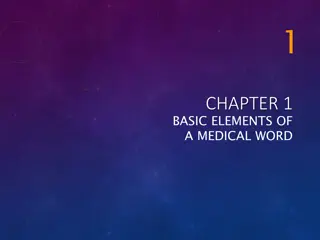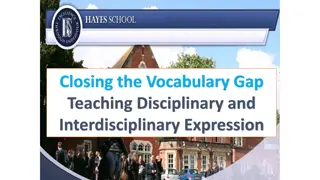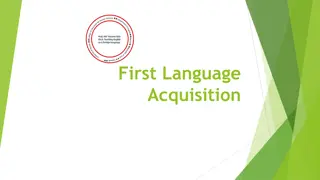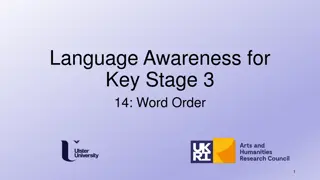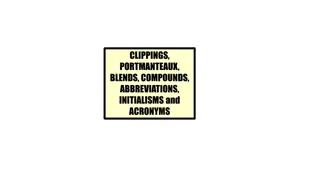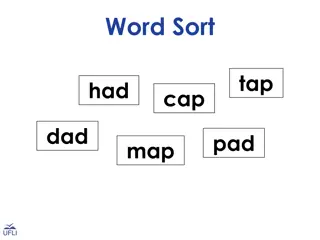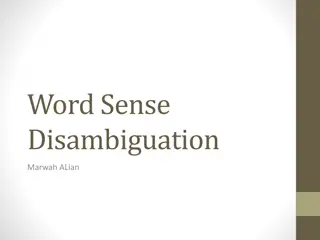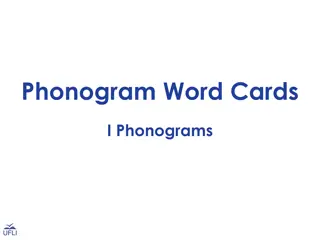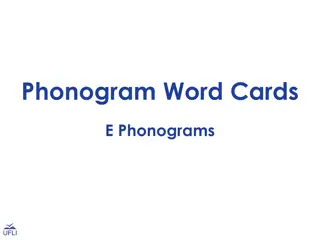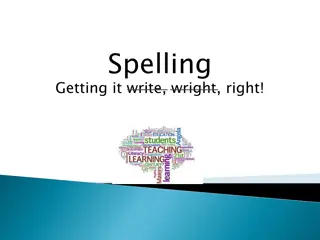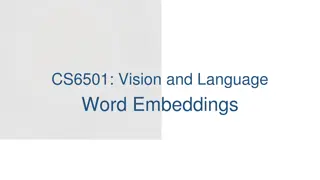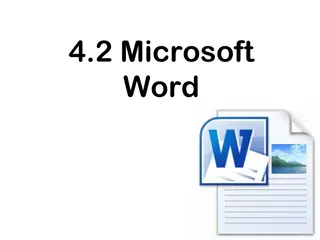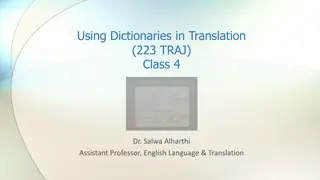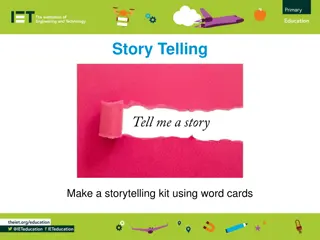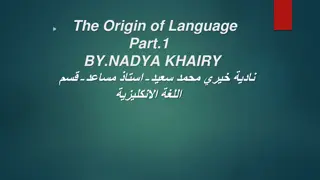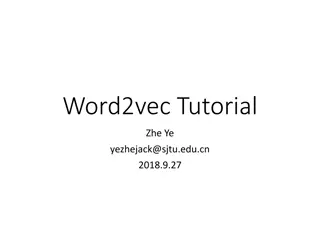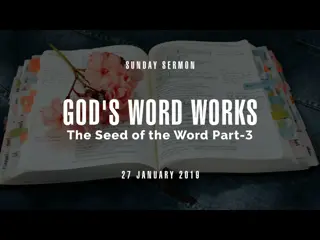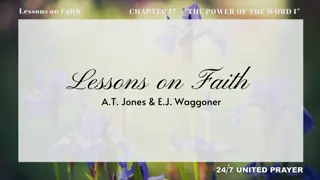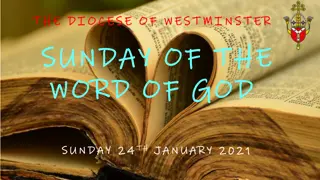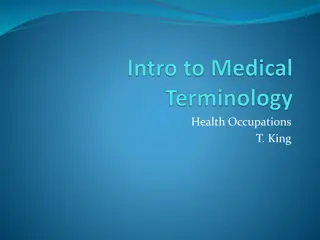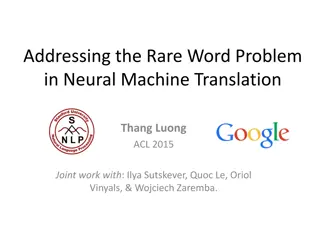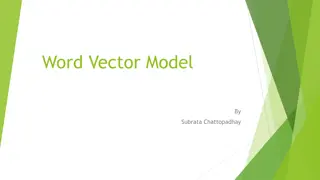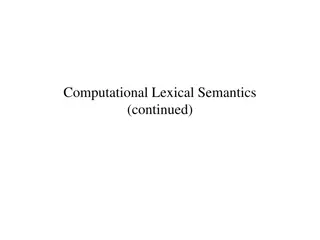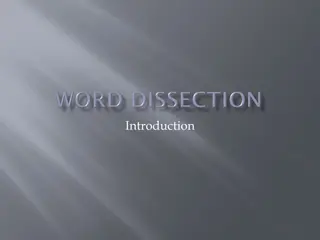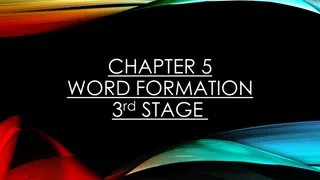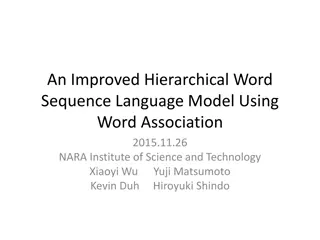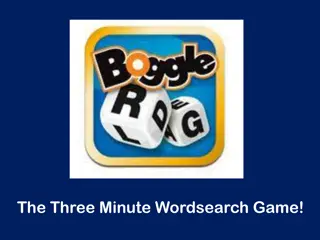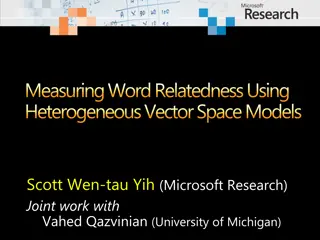Unraveling the Big Bang Theory and the Origins of the Universe
Explanation of the Big Bang Theory by Matthew Kogan, detailing the formation of the universe from a hot, dense mass expanding outward. As the universe cooled, particles formed, leading to the creation of stars and galaxies. The theory explores the imbalance between matter and antimatter, the intense
5 views • 12 slides
Medical Word Elements: Roots, Combining Forms, Suffixes, and Prefixes
Medical terminology uses word elements like roots, combining forms, suffixes, and prefixes. Word roots provide the main meaning, combining forms connect elements, suffixes modify word meaning, and prefixes are placed at the beginning of words. Examples illustrate how these elements are used in medic
6 views • 13 slides
Origins and Tribes of Central Islamic Lands: A Historical Overview
Explore the origins of Jewish tribes in Saudi Arabia, the diverse tribal backgrounds in Central Islamic lands, and the cultural landscape of pre-Islamic societies in the Arabian Peninsula. Discover the ancient civilizations, dominant tribes, and sources of historical evidence that shed light on the
0 views • 23 slides
Enhancing Academic Vocabulary through Evaluation and Synonyms
Explore the importance of teaching explicit vocabulary in subject areas, such as History, through activities like using Frayer diagrams and understanding word definitions. Learn how to evaluate historical events like the reign of Henry VIII, and delve into the origins of the word "sincere." Enhance
0 views • 14 slides
Stages of First Language Acquisition in Children
First language acquisition in children progresses through distinct stages including cooing and babbling, the one-word stage, the two-word stage, and telegraphic speech. These stages mark the development of speech sounds, single-word utterances, two-word combinations, and more complex speech structur
5 views • 16 slides
Word Order in Different Languages
Explore the fascinating world of word order in languages. Discover how different languages arrange words in various ways, such as Subject-Verb-Object (SVO), Subject-Object-Verb (SOV), and more. Delve into the diversity of word orders for subjects, objects, and verbs, and uncover how language structu
4 views • 31 slides
Exploring Word Formation: Clippings, Portmanteaux, Blends, Compounds, Abbreviations, and Acronyms
Discover different ways words are constructed through compound words, blend words, clippings, abbreviations, and initialisms. Learn about the origins and meanings of various word forms within the realm of linguistics.
0 views • 7 slides
Sources of Drugs and Their Origins
Drugs can be sourced from six major categories: plants, animals, minerals/earth, microbiological sources, semi-synthetic sources, synthetic sources, and recombinant DNA technology. Plant sources, being the oldest, provide various medicinal properties through leaves, flowers, fruits, seeds, roots, ba
1 views • 11 slides
Faithful Living and Preaching God's Word in 2 Timothy
In 2 Timothy, the call to preach the Word faithfully is emphasized, highlighting the importance of living with courage and commitment in spreading God's message. The text underscores the need to remain steadfast in the face of challenges and to uphold the truth of God's Word amidst changing times. T
1 views • 12 slides
Engaging Word Sorting Activity for Students
Encourage student engagement with a hands-on word sorting activity involving phonograms. Students copy word cards into categories, read each word, and determine its appropriate category in a fun and interactive manner using a sorting chart.
2 views • 5 slides
Word Sense Disambiguation: Challenges and Approaches
Word Sense Disambiguation (WSD) is a complex task in artificial intelligence that aims to determine the correct sense of a word in context. It involves classifying a word into predefined classes based on its meaning in a specific context. WSD requires not only linguistic knowledge but also knowledge
6 views • 12 slides
Phonogram Word Cards for Phoneme-Grapheme Correspondences
Explore lists of words with the same phonograms to teach new phoneme-grapheme correspondences, ideal for review games like Word Sorts and other activities requiring phonogram-based word lists. Enhance reading and spelling skills through engaging practices with word groups like nice, price, rice, sli
1 views • 26 slides
Word Formation: Processes, Neologisms, and Borrowing
Delve into the fascinating world of word formation processes, from coinage and eponyms to borrowing and compounding. Explore how new words enter languages, the study of word origins (etymology), and the dynamics of creating and adopting new linguistic terms.
0 views • 16 slides
Phonogram Word Cards for Teaching Phoneme-Grapheme Correspondences
Explore a collection of phonogram word cards featuring various phoneme-grapheme correspondences for educational activities like word sorts and review games. Enhance phonics skills with word lists containing words sharing the same phonogram, covering a wide range of graphemes and phonemes. Utilize th
1 views • 32 slides
Reevaluating Christmas: Origins and Traditions Examined
As we approach the holiday season, questions may arise about the true origins and traditions of Christmas. This article delves into the historical background and misconceptions surrounding the celebration, exploring whether it aligns with Christian beliefs and practices. Discover the origins of Dece
0 views • 26 slides
Enhancing Spelling Skills in the New Primary Curriculum
Implications and changes in spelling education, support strategies for parents, analysis of letter order impact, diagnostic testing for progress tracking, increased expectations on spelling rules, word origins, and demanding word lists, focus on phonics and compound words, rules for verb tenses, plu
0 views • 16 slides
Word Roots: Origins and Meanings in English Language
Explore the fascinating world of word roots in the English language with this comprehensive review. Discover the significance of word parts, generalizations, and application in various contexts, from drama and opera to privilege and prejudice. Uncover the relationships between root words and their d
0 views • 17 slides
Word Meaning in Lexical Semantics
Introduction to Chapter 5 Lecture 4.1 discusses the nature of word meaning, major problems of lexical semantics, and different approaches. It explains the concept of a word, prototypical words, lexical roots, lexemes, and word forms, highlighting the importance of the word as a lexeme in lexical sem
2 views • 20 slides
Exploring Word Embeddings in Vision and Language: A Comprehensive Overview
Word embeddings play a crucial role in representing words as compact vectors. This comprehensive overview delves into the concept of word embeddings, discussing approaches like one-hot encoding, histograms of co-occurring words, and more advanced techniques like word2vec. The exploration covers topi
5 views • 20 slides
Microsoft Word: Features and Functions
Explore the key components and objectives of Microsoft Word, a versatile word processing tool in the Microsoft Office Suite. Learn about the user interface, commands, text manipulation, keyboard shortcuts, working with pictures and language tools, and the benefits of using word processing software.
0 views • 29 slides
Word Formation and Coinage in English
Word formation in English involves different processes such as compounding, conversion, and derivational affixation. Compounding combines two or more words to create a new word, while conversion changes the word class without affixes. Word coinage includes compounds, acronyms, back-formations, abbre
1 views • 10 slides
Role of Dictionaries in Translation
Dictionaries play a crucial role in translation by helping users find information about linguistic signs, word division, spelling, and word formation. The lemma serves as a representative of a lexical item in a dictionary, aiding users in locating specific entries. Word division information can assi
1 views • 12 slides
Creative Word Play Storytelling Kit
Unleash your creativity with the Creative Word Play Storytelling Kit using word cards. Safely cut out and sort the word cards into piles representing different parts of speech. Create unique sentences by combining cards from each pile and let your imagination run wild as you build stories. Expand th
0 views • 6 slides
The Origins of Language: Divine, Natural, and Experiential Sources
Delve into the fascinating exploration of the origins of language, examining theories including divine origins as gifts from gods, natural sound sources through onomatopoeia, genetic influences, and experimental attempts to uncover language's beginnings. Discover intriguing insights into the diverse
0 views • 8 slides
Word Vectors and Training with Gensim
Explore the differences between one-hot representation and word vectors, learn about virtual environments in Python for training word vectors, and dive into the process of evaluation, analogy, and word clustering. Discover tools like Anaconda and Virtualenv, popular libraries like Gensim, and the si
0 views • 16 slides
Text Similarity Techniques in NLP
Explore various text similarity techniques in Natural Language Processing (NLP), including word order, length, synonym, spelling, word importance, and word frequency considerations. Topics covered include bag-of-words representation, vector-based word similarities, TF-IDF weighting scheme, normalize
3 views • 62 slides
The Parable of the Sower and Receiving God's Word
The Parable of the Sower teaches us how to receive and nurture God's Word in our hearts to produce fruit in our lives. Through the seed of God's Word, we learn the importance of protecting, understanding, and guarding our hearts from distractions and challenges that may hinder its growth and impact.
0 views • 24 slides
The Power of the Word: Lessons on Faith Chapter 17
Discover the profound impact of the Word of God on our lives as portrayed in Lessons on Faith Chapter 17. Just as the earth thrives with rain and snow, our lives flourish with the Word. Embrace the transformative power of God's Word and let it work within you to bring forth righteousness and peace.
0 views • 13 slides
The Sunday of the Word of God Celebration - 24th January 2021
The Sunday of the Word of God, observed on the 24th of January 2021, is dedicated to the celebration, study, and dissemination of the Word of God. Pope Francis encourages Catholics worldwide to deepen their relationship with God through His Word. The event highlights the importance of valuing both t
1 views • 27 slides
Word Parts in Medical Language
Learn about the essential word parts in medical terminology, including prefixes, suffixes, roots, and combining forms. Discover how to analyze and build medical terms for better understanding and communication in health occupations. Explore the origins of medical language to grasp the foundations of
0 views • 25 slides
Addressing the Rare Word Problem in Neural Machine Translation
Thang Luong and team addressed the rare word problem in Neural Machine Translation by proposing an approach to track the origins of rare words in target sentences. They utilized unsupervised alignments and relative indices in the training data and implemented a post-processing method for test transl
0 views • 21 slides
Word Vector Models for Natural Language Processing
Word vector models play a crucial role in representing words as vectors in NLP tasks. Subrata Chattopadhyay's Word Vector Model introduces concepts like word representation, one-hot encoding, limitations, and Word2Vec models. It explains the shift from one-hot encoding to distributed representations
1 views • 25 slides
Word Sense Disambiguation in Computational Lexical Semantics
Word Sense Disambiguation (WSD) is a crucial task in Computational Lexical Semantics, aiming to determine the correct sense of a word in context from a fixed inventory of potential word senses. This process involves various techniques such as supervised machine learning, unsupervised methods, thesau
0 views • 67 slides
Decoding English: Understanding Word Origins and Meanings
Explore the fascinating world of English language roots and word parts derived from Latin and Greek. Learn how recognizing these components can help you decode unfamiliar words with ease. Dive into examples and practice dissecting words to enhance your vocabulary skills.
0 views • 9 slides
Exploring Word Formation: Etymology, Borrowing, Compounding, and More
Explore various processes of word formation including etymology, borrowing, compounding, blending, clipping, backformation, conversion, acronyms, derivation, prefixes, suffixes, and infixes. Learn about the origins and history of words, the creation of new terms, and how different morphemes are adde
0 views • 8 slides
Morphology in Linguistics
Morphology is a branch of linguistics that focuses on word structure and the smallest meaningful units of language known as morphemes. It delves into the decomposition of words and the classification of morphemes into bound and free categories. Bound morphemes, such as prefixes and suffixes, modify
0 views • 16 slides
Biblical Faith and Obedience in Action: Just Believe and Obey God's Word
The statement "Thy word is settled in Heaven" highlights the authority and power of God's word, emphasizing the fulfillment of His promises. Belief, knowledge, reasoning, and obedience are all interconnected in expressing true faith as illustrated through various biblical references. The call to "Ju
0 views • 6 slides
Improved Hierarchical Word Sequence Language Model Using Word Association
This research presents an enhanced hierarchical word sequence language model leveraging word association techniques. It explores the motivation behind the model, smoothing techniques for data sparsity, and the basic idea of the proposed approach, focusing on patterns and word generation. The propose
0 views • 21 slides
The Three Minute Wordsearch Game!
Test your word-finding skills with The Three Minute Wordsearch Game! Make as many words as you can in three minutes using the given letters. Look out for a specific key word linked to today's lesson. Words must be at least three letters long, with points awarded based on word length. Can you find th
0 views • 7 slides
Measuring Word Relatedness Using Vector Space Models
This presentation delves into the intricate world of word relatedness through the lens of Heterogeneous Vector Space Models. Learn about measuring semantic word relatedness, sentence completion challenges, and the significance of Vector Space Model in understanding word meaning. Explore the need for
0 views • 19 slides

